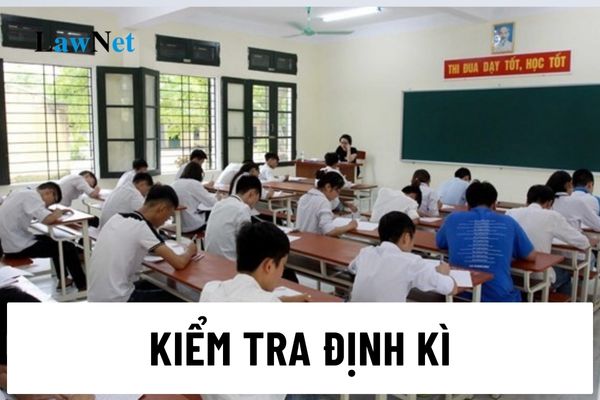Will the Literature subject in Vietnam not be periodically tested with the texts and excerpts that have been studied in the textbooks?
Will the Literature subject in Vietnam not be periodically tested with the texts and excerpts that have been studied in the textbooks?
Pursuant to Subsection 3, Section 1, Part B of Official Dispatch 3935/BGDDT-GDTrH Year 2024 guiding the implementation of secondary education tasks for the academic year 2024-2025 issued by the Ministry of Education and Training:
Implementation of secondary education program
3. Effectively implementing methods and forms of assessment
a) Assess secondary and high school students according to the conformity, not exceeding the required achievements of the program, noting some contents such as: developing an assessment plan consistent with the teaching plan; enhancing the implementation of periodic assessments through practice tasks, learning projects. For the subject of Vietnamese Literature, avoid using texts and excerpts already studied in textbooks to evaluate reading comprehension and writing skills in periodic tests to rectify the situation of students memorizing or copying from available materials[5].
b) Enhance the construction of question banks, test matrices according to the requirements of the subject, prepare 9th-grade students to familiarize themselves with the orientation for 10th-grade entrance exams, and 12th-grade students with the orientation for high school graduation exams[6].
The Ministry of Education and Training advises against using texts and excerpts from textbooks for periodic assessments of reading comprehension and writing skills in Vietnamese Literature.
This is to prevent secondary school students from merely memorizing or copying available materials.

Will the Literature subject in Vietnam not be periodically tested with the texts and excerpts that have been studied in the textbooks? (Image from the Internet)
What are regulations on periodic assessments of secondary students in Vietnam?
Periodic assessment is an activity to evaluate the results of training and studying after a period in the school year to determine the extent to which students fulfill their training and studying tasks according to the required achievements stipulated in the General Education Program; provide feedback for educational administrators, teachers, and students to adjust teaching activities; and confirm the results achieved by students. (Article 2 Circular 22/2021/TT-BGDDT)
According to Article 7 of Circular 22/2021/TT-BGDDT, periodic assessments of secondary students are stipulated as follows:
(1). Periodic assessments (not applicable for thematic learning modules), including mid-term and end-term evaluations, are conducted through: paper-based tests, computer-based tests, practical tasks, learning projects (also known as periodic tests).
- The duration for paper-based or computer-based tests for subjects (excluding thematic learning modules) with up to 70 lessons per year is 45 minutes, while subjects with more than 70 lessons per year range from 60 to 90 minutes; specialized subjects up to 120 minutes.
- For paper-based or computer-based tests evaluated by scores, the test is constructed based on a matrix and specifications that meet the requirements of the subject as defined in the General Education Program.
- For paper-based or computer-based tests evaluated by comments, practical tasks, and learning projects, there must be guidelines and evaluation criteria that meet the subject requirements as defined in the General Education Program before implementation.
(2). In each semester, each subject evaluated by comments has one mid-term and one end-term evaluation.
(3). In each semester, each subject evaluated by a combination of comments and scores has one mid-term score and one end-term score.
(4). Students who do not participate in the assessments as stipulated in (2) and (3) due to force majeure reasons are allowed to take make-up assessments with equivalent requirements to the missed ones. Make-up assessments are conducted each semester.
(5). Students who do not partake in the make-up assessments as stipulated in (4) will be evaluated as Not Achievable or receive 0 (zero) points for the missed assessments.
What are regulations on classification of the academic performance of secondary school students in Vietnam?
Pursuant to Article 9 of Circular 22/2021/TT-BGDDT, the evaluation and grading of academic performance each semester and the entire academic year for secondary students are as follows:
For subjects evaluated by a combination of comments and scores, the average semester score (DTBmhk) is used to assess the academic performance of students each semester, and the average yearly score (DTBmcn) is used to assess their performance for the entire academic year.
The academic performance of students each semester and the entire academic year is evaluated at one of four levels: Excellent, Good, Pass, or Not Pass as follows:
| Grading Level | Evaluation Criteria |
| Excellent Level |
+ All subjects evaluated by comments are assessed as Pass. + All subjects evaluated by a combination of comments and scores have an average yearly score (DTBmcn) of 6.5 or higher, with at least 6 subjects having an average yearly score (DTBmcn) of 8.0 or higher. |
| Good Level |
+ All subjects evaluated by comments are assessed as Pass. + All subjects evaluated by a combination of comments and scores have an average yearly score (DTBmcn) of 5.0 or higher, with at least 6 subjects having an average yearly score (DTBmcn) of 6.5 or higher. |
| Pass Level |
+ At most 1 (one) subject evaluated by comments is assessed as Not Pass. + At least 6 (six) subjects evaluated by a combination of comments and scores have an average yearly score (DTBmcn) of 5.0 or higher; no subject has an average yearly score (DTBmcn) below 3.5. |
| Not Pass Level | All other cases |
Note: If the academic performance evaluation of the semester is downgraded by 2 (two) levels or more compared to the Excellent or Good levels solely due to the evaluation of 1 (one) subject, the academic performance evaluation for that semester and the entire academic year will be adjusted to the next higher level.

